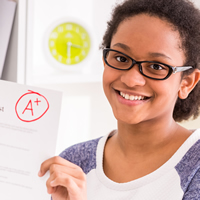As promised last time, this post continues the theme of study, and once again there are many differences between British and American English.
In the UK, the school year is divided into three periods, called terms. In the US, the school year can be divided into two periods, called semesters, or three periods, called trimesters. Many US universities have summer periods, so their year is divided into quarters. Students have a timetable(UK)/schedule (US) to tell them the times of their classes. To talk about what is taught in a particular subject area, we use the words syllabus or curriculum.
The person in charge of a school is called the headteacher in UK English and the principal in US English.
In a college or university, we use the word lecture for a lesson where a teacher speaks to many students in a large room called a lecture theatre (UK)/lecture hall (US). A lesson for a smaller group is often called a seminar, while a lesson with just one or two students is atutorial. In the US, a lesson for a group of students is called a class; the class can be a large lecture, a small seminar, or something in between. We often use the verb attend with these words:
I attended several of her lectures.
A person who teaches at a college or university is called a lecturer in the UK and a teacher or a professor in the US. In the UK, the title Professor is only used for the most senior lecturers.
If you study a subject such as history or literature, you will certainly have to write essays. In the UK, a longer piece of writing, often done as part of a college or university course, is a dissertation, while the written work for a PhD is a thesis. Confusingly, in the US it is the other way round – with US students writing a master’s thesis and a doctoral dissertation. When you do a piece of writing, you may start with a rough draft (a basic plan) and you may need to do some research to find the facts you need.
Remember to use the verb do (not ‘write’ or ‘make’) with homework, and also that the word ‘homework’ is uncountable – don’t put ‘a’ in front of it or try to make it plural! Your teacher sets (UK)/assigns (US) your homework (tells you what to do), and you may have to hand it in (UK and US)/turn it in (US) (give it to the teacher) the next day.
When your teacher is talking, you may make notes (write some things down) in a notebook so that you will remember what was said. You may use a textbook in class, with information about the subject you are studying. For subjects such as languages, you do exercises to practise what you are learning. For maths (UK)/math (US), you may need toshow your workings (UK)/work (US) (write down how you reached the answer).





